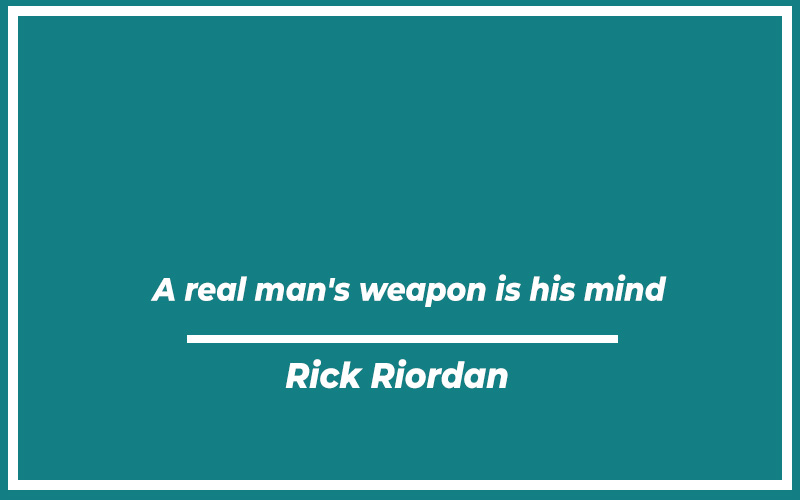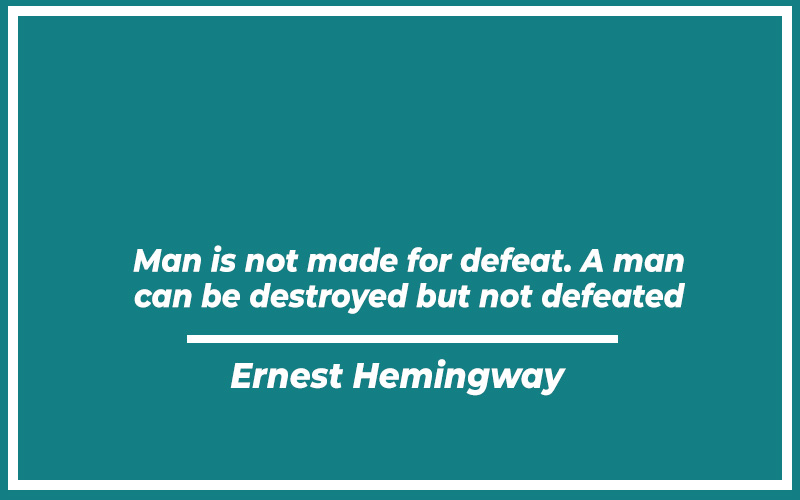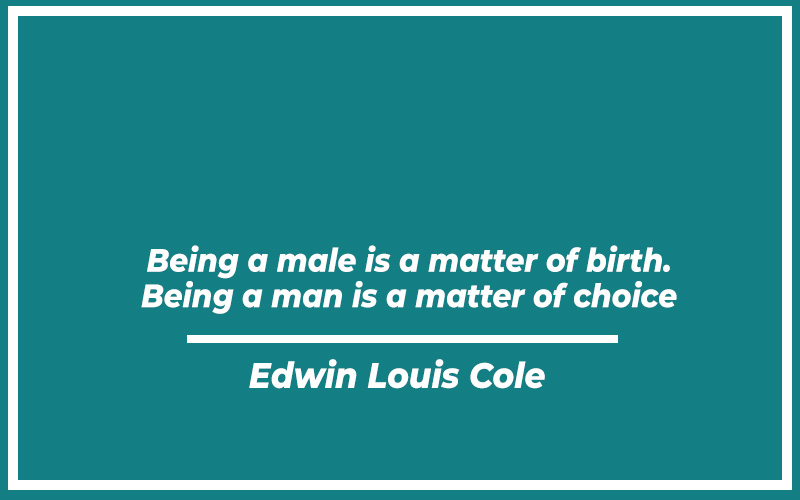“Real men quotes” are sayings that help explain what it means to be a good man.
They come from all sorts of people—famous folks, thinkers, and leaders—and give us ideas about the good qualities a man should have. They talk about things like being brave, honest, and strong.
These quotes are meant to inspire you to be better and show you how to handle tough situations or just daily life. They remind you what is important if you want to be respected and looked up to.
Best Real Men Quotes

“A real man’s weapon is his mind.” – Rick Riordan
This quote by Rick Riordan underscores the power of intellect over physical strength in defining manhood. The commentary here suggests that true strength comes not from physical capabilities but from the intellectual and emotional depth a man possesses. In a world that often glorifies physical prowess, Riordan’s perspective shifts the focus to mental strength, highlighting its importance in overcoming challenges and making wise decisions.
The emphasis on the mind as a “weapon” also points to the ability of thought and knowledge to influence and navigate the complexities of life, encouraging men to cultivate their mental faculties as the true measure of their strength.
Also read: Nick Saban Quotes (with Explanation)
“The ultimate measure of a man is not where he stands in moments of comfort and convenience, but where he stands at times of challenge and controversy.” – Martin Luther King Jr.
Martin Luther King Jr.’s observation about manhood pivots on the idea that true character is revealed not during peaceful times but in moments of great adversity. This quote encourages men to show resilience and steadfastness when faced with difficulties.
The commentary around this idea would emphasize the importance of integrity and moral courage, suggesting that a man’s true strength is demonstrated by his actions and choices under pressure, reflecting his core values and principles.
“To be a man is, precisely, to be responsible.” – Antoine de Saint-Exupery
Antoine de Saint-Exupery’s concise definition of manhood as being synonymous with responsibility highlights the role of accountability in personal development. This quote serves as a reminder that manhood involves a commitment to fulfilling one’s duties and obligations, whether they be personal, professional, or societal.
The commentary could discuss how embracing responsibility shapes a man’s identity and impacts his ability to contribute positively to his community and family, marking his transition from youth into a mature individual.
“Nothing deters a good man from doing what is honourable.” – Seneca the Younger
Seneca the Younger’s insight into the nature of a good man emphasizes unwavering commitment to honor, regardless of the obstacles. This quote might be discussed in terms of how integrity and ethical conduct define a man’s interactions and decisions.
The commentary could reflect on the importance of maintaining moral high ground, even in situations where it may be easier or more beneficial in the short term to compromise on one’s principles.
“Men have an important role to play in sending out the message that real men do not hurt or abuse their partners.” – Ian Somerhalder
Ian Somerhalder’s quote sheds light on the critical role men have in advocating against domestic violence and promoting healthy relationships.
This commentary would delve into the responsibility men have to model respect and kindness within relationships, challenge toxic masculinity, and support efforts that encourage emotional openness and equality. It could also discuss how such attitudes contribute to broader societal benefits, including stronger families and communities.
“The heart of a good man is the sanctuary of God in this world.” – Suzanne Curchod
Suzanne Curchod’s quote connects the goodness of a man’s heart to a divine presence, suggesting that spirituality and moral integrity are central to manhood.
This commentary could explore the relationship between a man’s inner life and his outward actions, proposing that true manliness encompasses compassion, empathy, and a commitment to higher principles that guide one’s conduct.
“The time is always right to do what is right.” – Martin Luther King, Jr.
Revisiting Martin Luther King Jr., this quote serves as a universal call to action for ethical behavior. The commentary on this quote would likely discuss the timeless nature of moral correctness, irrespective of circumstances.
It encourages men to take initiative and act with justice and fairness, highlighting that every moment presents an opportunity to make morally sound decisions, reinforcing the idea that manhood is defined through consistent ethical actions.
“Earth provides enough to satisfy every man’s needs, but not every man’s greed.” – Mahatma Gandhi
Mahatma Gandhi’s quote reflects on the distinction between need and greed, emphasizing sustainability and moderation. This commentary could discuss the responsibility men have in fostering an environment of conservation and respect towards nature.
It suggests that true manhood involves understanding and acting upon the limits of consumption, promoting a lifestyle that values resource preservation for future generations, rather than indulging in excessive and unsustainable practices that harm the environment and widen social inequalities.
“Believe you can and you’re halfway there.” – Theodore Roosevelt
Theodore Roosevelt’s motivational words emphasize the power of self-belief in achieving goals. This commentary could discuss how self-confidence is crucial in overcoming the challenges that life throws at a man.
It encourages individuals to maintain a positive outlook and a resilient mindset, suggesting that much of success hinges on one’s belief in their capabilities before any actual steps are taken towards achieving a goal, aligning with the idea that mental preparedness is as important as physical or tactical readiness.
“Waste no more time arguing about what a good man should be. Be one.” – Marcus Aurelius
Marcus Aurelius advocates for action over deliberation in defining manhood. This quote could be expanded in commentary to discuss the importance of exemplifying virtues rather than merely discussing them.
It suggests that the essence of true manhood is found in the demonstration of ethical behavior and integrity, encouraging men to actively embody the qualities of a good man, such as honesty, responsibility, and kindness, rather than getting caught up in theoretical debates about these ideals.
“A man who has committed a mistake and doesn’t correct it is committing another mistake.” – Confucius
Confucius highlights the importance of learning from errors as a key component of manhood. This commentary could reflect on the continuous journey of self-improvement that defines a man.
It encourages embracing failures as opportunities for growth and emphasizes the responsibility men have to acknowledge their faults and make amends, thereby fostering a culture of accountability and progressive development in personal and professional spheres.
“The strength of a man isn’t seen in the width of his shoulders. It’s seen in the width of his arms that encircle you.” – Tom Hanks
Tom Hanks’ quote sheds light on the emotional and relational aspects of strength in manhood. This commentary could explore how true strength is often shown through support, protection, and emotional availability rather than just physical prowess.
It suggests that a man’s ability to offer comfort and security to those around him is a more accurate measure of his strength than traditional markers of masculinity like muscle and endurance.

“Man is not made for defeat. A man can be destroyed but not defeated.” – Ernest Hemingway
Ernest Hemingway’s quote speaks to the indomitable spirit inherent in manhood. This commentary could discuss resilience as a defining characteristic of a man, highlighting that despite life’s adversities, a true man remains undefeated in spirit.
It encourages perseverance and courage in the face of overwhelming odds, suggesting that the essence of manhood lies in the ability to withstand and rise above challenges, not merely in avoiding defeat.
“The true measure of a man is how he treats someone who can do him absolutely no good.” – Samuel Johnson
Samuel Johnson emphasizes the importance of altruism in defining manhood. This commentary could reflect on the integrity and kindness one shows towards those from whom they have nothing to gain.
It suggests that the true character of a man is revealed in his actions towards the less fortunate or those unable to reciprocate, advocating for compassion and selflessness as foundational traits of a genuine and honorable man.
“A man is not old until regrets take the place of dreams.” – John Barrymore
John Barrymore’s quote offers a perspective on age and ambition, suggesting that a man remains youthful as long as he harbors dreams instead of regrets. This commentary could delve into the concept that true manhood involves a lifelong pursuit of aspirations and learning from past mistakes instead of dwelling on them.
It encourages maintaining a forward-looking mindset, which invigorates a man’s spirit and continually drives personal growth and fulfillment.
“The quality of a man’s life is in direct proportion to his commitment to excellence, regardless of his chosen field of endeavor.” – Vince Lombardi
Vince Lombardi’s statement underscores the significance of dedication and striving for excellence in defining the worth of a man’s life.
This commentary could explore how commitment to personal and professional growth shapes a man’s character and life outcomes. It suggests that the essence of manhood is reflected in how a man dedicates himself to mastering his crafts and living with purpose, irrespective of his career path.
“Only a man who knows what it is like to be defeated can reach down to the bottom of his soul and come up with the extra ounce of power it takes to win when the match is even.” – Muhammad Ali
Muhammad Ali’s reflection on defeat and victory highlights resilience and inner strength. This commentary might discuss the idea that experiencing and overcoming defeat is essential for developing the fortitude needed to achieve success.
It emphasizes that a man’s true strength is shown by his ability to persist and summon courage in the face of adversity, turning challenges into triumphs.
“Men are like steel. When they lose their temper, they lose their worth.” – Chuck Norris
Chuck Norris’s analogy between men and steel emphasizes the importance of self-control in maintaining one’s value.
This commentary could discuss the destructive impact of uncontrolled anger and the significance of emotional regulation in a man’s life. It suggests that maintaining composure under pressure is a crucial aspect of manhood, preserving integrity and respectability.
“The only real mistake is the one from which we learn nothing.” – Henry Ford
Henry Ford’s quote about mistakes and learning emphasizes the importance of reflection and adaptation. This commentary could explore the concept that true growth for a man involves learning from every failure and using those lessons to improve.
It encourages a mindset of continual learning and growth, which is central to achieving personal and professional success.
“No great man ever complains of want of opportunity.” – Ralph Waldo Emerson
Ralph Waldo Emerson suggests that truly great men create their opportunities rather than lament their absence. This commentary might reflect on the proactive nature required to seize or create opportunities in life.
It discusses how a man’s greatness is often demonstrated by his initiative and creativity in overcoming obstacles and capitalizing on situations, rather than waiting for chances to come to him.
“A man does what he must – in spite of personal consequences, in spite of obstacles and dangers and pressures – and that is the basis of all human morality.” – John F. Kennedy
John F. Kennedy’s quote highlights the essence of duty and moral integrity in manhood. This commentary could explore the idea that true manhood is about adhering to one’s principles and duties, even when faced with personal risks or challenges.
It underscores the importance of moral courage and the role it plays in defining a man’s character and ethical standards.
“The true measure of leadership is influence – nothing more, nothing less.” – John C. Maxwell
John C. Maxwell’s observation on leadership highlights the central role of influence in guiding others.
This commentary might explore the idea that the essence of leadership, and thus a significant aspect of manhood, lies in one’s ability to impact others positively. It suggests that a man’s real power is not measured by his title or status but by his capacity to inspire, guide, and shape the behaviors and beliefs of others.
“To admit mistakes and correct them is the hallmark of a great man.” – Richard Nixon
Richard Nixon’s quote emphasizes the importance of acknowledging and rectifying errors as a sign of greatness. This commentary could discuss how humility and the willingness to learn from mistakes are vital for personal growth and integrity.
It suggests that a man’s greatness is often demonstrated by his ability to face his shortcomings and strive for improvement, which in turn earns respect and trust from others.
“He who conquers himself is the mightiest warrior.” – Confucius
Confucius speaks to the ultimate challenge of self-mastery. This commentary could delve into how true manhood involves more than overcoming external adversaries; it requires conquering one’s own weaknesses and impulses.
It emphasizes that the mark of a true man lies in his ability to control his actions and emotions, aligning them with his values and goals.
“Life’s most persistent and urgent question is, ‘What are you doing for others?'” – Martin Luther King Jr.
Martin Luther King Jr.’s quote challenges individuals to evaluate their contributions to the welfare of others.
This commentary might reflect on how manhood can be measured by one’s dedication to service and the betterment of society. It encourages a life oriented towards altruism and community service, suggesting that true fulfillment and purpose are found in helping others.
“Courage is not having the strength to go on; it is going on when you don’t have the strength.” – Theodore Roosevelt
Theodore Roosevelt’s perspective on courage highlights resilience. This commentary could explore the essential role of perseverance in the face of adversity.
It posits that the core of manhood involves the gritty determination to continue striving towards one’s goals and responsibilities, even when faced with overwhelming odds or fatigue.
“The mark of a great man is one who knows when to set aside the important things in order to accomplish the vital ones.” – Brandon Sanderson
Brandon Sanderson’s insight into prioritization and decision-making underscores a crucial aspect of manhood.
This commentary could discuss how the ability to discern and focus on what truly matters, rather than getting lost in the minutiae of life, is a key trait of a great man. It suggests that leadership and personal effectiveness are about making hard choices that prioritize vital goals over merely important ones.

“Being a male is a matter of birth. Being a man is a matter of choice.” – Edwin Louis Cole
Edwin Louis Cole differentiates between mere gender and true manhood. This commentary might discuss the conscious choices and behaviors that define manhood, beyond biological determinants.
It emphasizes that true manhood is demonstrated through decisions that reflect maturity, integrity, and responsibility.
Also read: Co-Parenting Quotes (with Explanation)
Final Thoughts
Quotes about real men remind us to be strong, honest, and kind. They encourage you to be the best you can be, respect others, and stay true to what you believe.
These quotes are like little pieces of advice, pushing us all to be better in how we behave and treat people.

